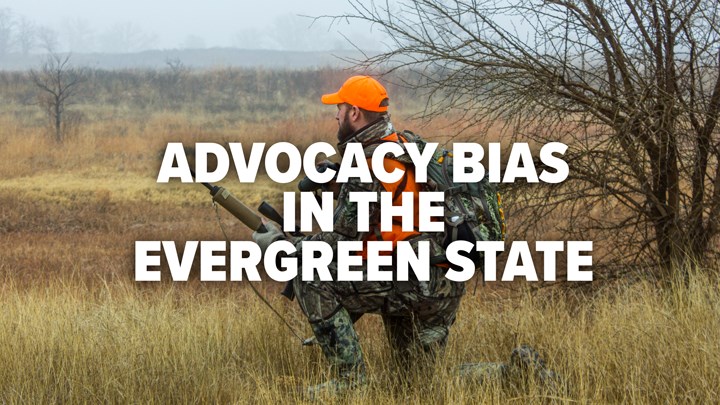
by Cody McLaughlin - Friday, June 24, 2022

After a contentious spring battle that led to the Washington State Fish and Wildlife Commission (FWC) voting 5-4 to shut down the state’s spring bear hunt, state wildlife commissioners are now debating each other over the future of the state’s game management plan. Eyebrows have been raised as to just how far new anti-hunting commissioners in the mix are prepared to go to advance their advocacy interests.
As reported by the Lewiston Tribune on June 3, sparks flew during a Washington State Fish and Wildlife Commission (FWC) meeting when some anti-hunting commissioners pushed to survey public and hunter attitudes regarding hunting practices. Commissioners Lorna Smith and Melanie Rowland demanded to see early drafts of a public opinion survey of attitudes on hunting and hunting practices—a departure from the norm that was questioned by Game Division Manager Eric Gardner. In response to the pushback and suggestion that commissioners receive both the public opinion survey and a companion one on hunters’ attitudes, the commissioners not in favor of hunting dismissed the hunter survey and pressed on, claiming there is an urgent need for an update to the state’s game management plan. Never mind the details on the urgency or the reasoning behind the demands to break established protocol or the fact hunter sentiments are being ignored in the process.
Rowland, a former environmental attorney against hunting who was appointed to the FWC by Gov. Jay Inslee earlier this year, claimed she was very concerned in having the commissioners be the ones in charge of regulating the taking of animals “with not-current science or population information or enough monitoring.”
Gardner, one of the only biologists in the room (for those keeping score at home), called the plan “a living document” and asserted that it was designed to live through its six-year period due to the work of staff biologists to stay up to date on the latest science. Commission Chairwoman Kim Thorburn and Commissioner Jim Anderson came just short of admonishing Rowland for combativeness, saying, “I’m hearing we are sort of to behave like staff and not trust our staff to carry out their responsibilities.”
Defying common sense, the issues unfortunately go beyond bears and surveys. Recent changes to the FWC resulted in four new commissioners, all of whom demonstrate tangible anti-hunting advocacy biases. These commissioners have signaled their openness to rethinking the state’s management of all predator species. They say reasons for doing this include “incorrect information,” “incomplete science” and other wild disparagements of the integrity of the professional biologists on staff.
Giving hunters an idea of what may be coming next in the Emerald State, a press release issued by the anti-hunting group Wildlife for All thanking Gov. Inslee for appointing Commissioner Rowland says it all: “These appointments by Gov. Inslee reflect Wildlife for All’s mission to reform wildlife management in the United States to be more ecologically-driven, democratic and compassionate.” Compassion, as American hunters know, is code for anti-hunting.
It’s this clear anti-hunting attitude of the state’s new commissioners that breeds the potential for the FWC to have disastrous consequences for the state’s wildlife and hunters. Let’s hope commission members can come to a consensus and create a plan that actually benefits the animals they’re supposed to be protecting rather than just benefitting their advocacy biases. Picking fights with the resource managers who use science to manage sustainable wildlife populations seems like the wrong move.
If the FWC puts forth a controversial proposal trouncing hunting and reimagining the state's game management plan, it would be in direct contrast to how the state has always approached hunting as a vital wildlife management tool. Hunters are rightfully worried. If the FWC is given the time and the space to continue proposing anti-science overhaul after anti-science overhaul, we could one day see an end to hunting altogether in Washington state.
In the meantime, the NRA Hunters’ Leadership Forum website just learned that the FWC is meeting on Friday and Saturday—June 24-25—at the Washington Department of Fish and Wildlife Natural Resource Building (1111 Washington St. SE, Olympia. WA 98501). Hunters should note that the agenda includes a “Spring Bear Policy Discussion” on June 24 at 3:40 p.m., during which time the FWC will accept public comments on its spring bear hunting policy both in person and via virtual testimony. For details and to make your voice heard, click here. While this discussion will not extend to rulemaking for the 2023 hunting season, the outcome of policy discussions may influence future spring bear rulemaking.
About the Author
Cody McLaughlin is a noted conservationist and conservative thought leader on public policy issues including hunting, fishing, gun rights, free-market tax and wage policy and the environment. He works as a GOP consultant for conservative political causes, managing clients’ digital communications and online presence and as a trustee of the New Jersey Outdoor Alliance, helping to represent the state’s 1.2 million sportsmen in the political arena.
E-mail your comments/questions about this site to:
[email protected]
